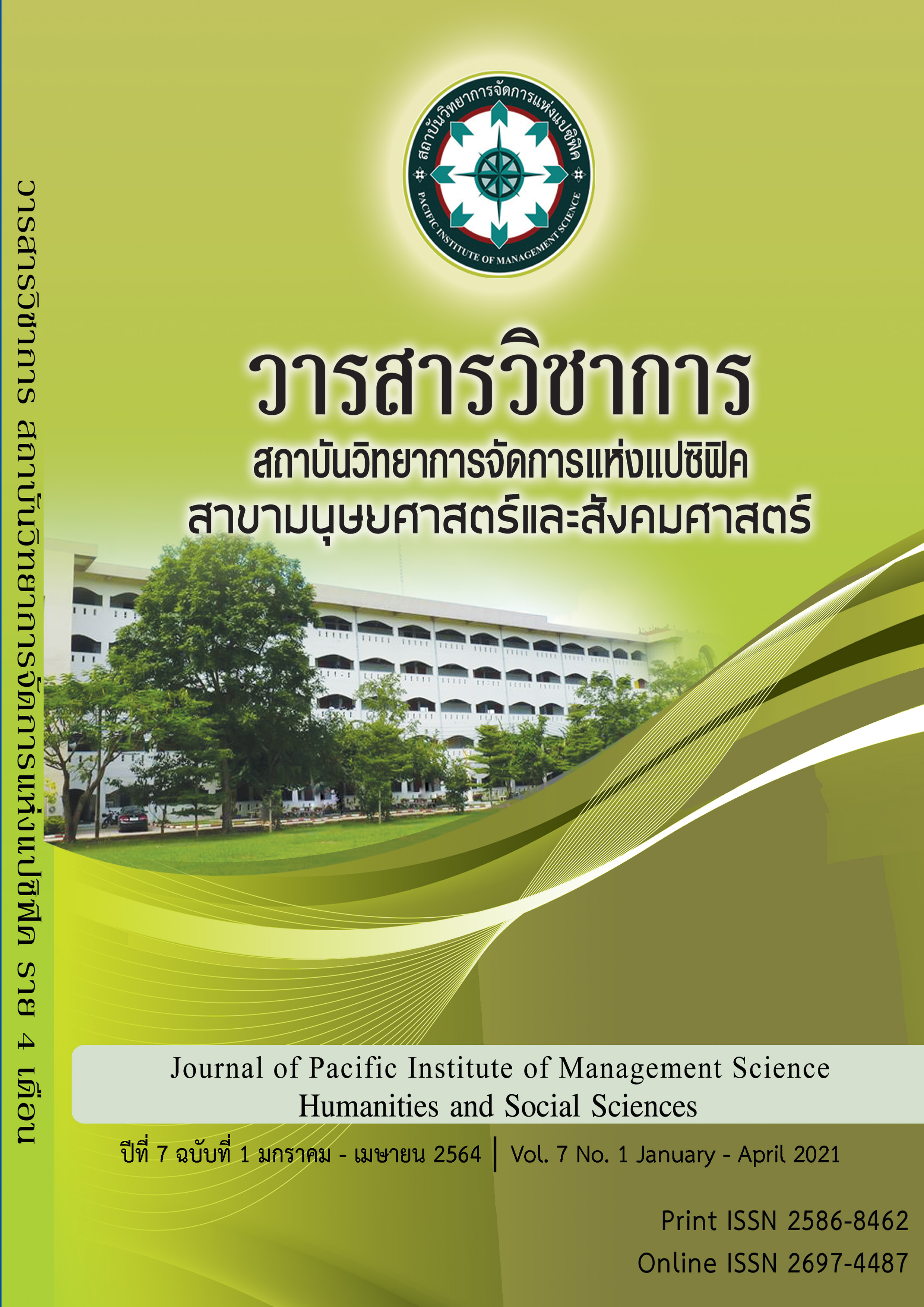Teaching Technology affects the Efficiency of Teacher Learning management. In Colleges under the Office of the Private Vocational Education Commission The North East
Keywords:
Teaching technology, Teacher Learning management, Office of the Private Vocational Education Commission.Abstract
The objective of this research is to 1) study the educational situations, concepts, theories and research related to how teaching technology affect the efficiency of learning management of teachers in colleges under The North-Eastern Office of Private Vocational Education Commission 2)study the relationship between the study concepts, theories and research related to teaching technology affect the efficiency of learning management of teachers in colleges under The North-Eastern Office of Private Vocational Education Commission 3)study the technology development guidelines that affect the efficiency of learning management. The sample group is the college director and teachers in the academic year of 2019, a total of 340 samples were selected. Statistics used are Frequency, Percentage, Mean, Standard Deviation (SD) and Multiple Regression Analysis (MRA). These statistical techniques used for analysing the results in order to receive clear and precise answer and prediction influence of predictive variables. The result of the research shows that teaching technology affects the efficiency of teacher learning management. The research results show that, encompassing seven factors of analysis of The Office of Private Vocational Education Commission, is at a high level and also found that the use of technology in the teaching process, measurement and evaluation, set learning goal, create activity, instructional media and effectiveness are seven variables that explain the variance of 87% with the test result of F with statistical significance of .05.The result of testing the independence of predictive variables according to the technique of Durbin Watson which is between1.5 but no more than 2.0 considered that the predictive variables are independent and can be used to create forecasting equations based on scores and the efficiency of teacher learning management of the relationship in the same direction was at a high level statistical significance level of .01 with value r Therefore, it is concluded that the variables are related in the same direction at a high level and that the statistical significance level of .01.
References
กระทรวงเทคโนโลยีสารสนเทศและการสื่อสาร.(2552). แผนแม่บทเทคโนโลยีสารสนเทศและการสื่อสาร(ฉบับที่2) ของประเทศไทยพ.ศ. 2552-2556.กรุงเทพฯ: กระทรวงเทคโนโลยีสารสนเทศและการสื่อสาร. (2554).
กรอบนโยบายเทคโนโลยีสารสนเทศและการสื่อสารระยะพ.ศ. 2554 –2563 ของประเทศไทย. (2559).กรุงเทพฯ: กระทรวงเทคโนโลยีสารสนเทศและการสื่อสาร. แผนพัฒนาดิจิทัลเพื่อเศรษฐกิจและสังคม. (2546). กรุงเทพฯ: กระทรวงเทคโนโลยีสารสนเทศและการสื่อสาร.กระทรวงศึกษาธิการ.
เขมนิจ ปรีเปรม. (2554). สมรรถนะด้านเทคโนโลยีสารสนเทศกับการบริหารระบบสารสนเทศของผู้บริหารสังกัดสานักงานเขตพื้นที่การศึกษาประถมศึกษานครปฐมเขต1.วิทยานิพนธ์ศึกษาศาสตรมหาบัณฑิตสาขาการบริหารการศึกษาบัณฑิตวิทยาลัยมหาวิทยาลัยศิลปากร,นครปฐม.
ชะเริงพจน์ พัดจันทร์หอม. (2554). การบริหารเทคโนโลยีสารสนเทศและการสื่อสารเพื่อการศึกษาของโรงเรียนมัธยมศึกษาในจังหวัดอุตรดิตถ์สังกัดสานักงานเขตพื้นที่การศึกษามัธยมศึกษาเขต 39.การค้นคว้าด้วยตนเองการศึกษามหาบัณฑิตสาขาวิชาการบริหารการศึกษามหาวิทยาลัยนเรศวร, พิษณุโลก.
ชัยภักดิ์ นิลดี. (2554). การศึกษาสภาพปัญหาและแนวทางแก้ไขการบริหารจัดการเทคโนโลยีสารสนเทศและ การสื่อสารของโรงเรียนในโครงการหนึ่งอําเภอหนึ่งโรงเรียนในฝันสังกัดสํานักงานเขตพื้นที่ การศึกษาพระนครศรีอยุธยาเขต1 และเขต2.วิทยานิพนธ์ครุศาสตรมหาบัณฑิตสาขาการบริหารการศึกษามหาวิทยาลัยราชภัฏพระนครศรีอยุธยา, พระนครศรีอยุธยา.
ชิณกรณ์ แก้วรักษา. (2554). การใช้เทคโนโลยีสารสนเทศเพื่อการบริหารโรงเรียนมัธยมศึกษาสังกัดสํานักงานเขตพื้นที่การศึกษากาฬสินธุ์เขต2.วิทยานิพนธ์ครุศาสตรมหาบัณฑิตสาขาวิชาการบริหารการศึกษามหาวิทยาลัยราชภัฏกาฬสินธุ์, กาฬสินธุ์.
ทินกร พูลพุฒ. (2552). การพัฒนารูปแบบการบริหารเทคโนโลยีสารสนเทศและการสื่อสารของสํานักงานเขต พื้นที่การศึกษาเพื่อพัฒนาการศึกษาของโรงเรียนขนาดเล็ก.วิทยานิพนธ์การศึกษาดุษฎีบัณฑิตสาขาการบริหารการศึกษามหาวิทยาลัยนเรศวร, พิษณุโลก. 89
บุญชม ศรีสะอาด. (2545). การวิจัยเบื้องต้น.(พิมพ์ครั้งที่7). กรุงเทพฯ: สุวีริยาสาสน์.
ปรัชญนันท์นิลสุข. (2551, กันยายน–ธันวาคม). การจัดการเทคโนโลยีสารสนเทศ: เครื่องมือการพัฒนาประเทศไทย.วารสารวิทยบริการมหาวิทยาลัยสงขลานครินทร์19 (3), 34-46.
พงษ์ศักดิ์ ผกามาศ. (2553). ระบบไอซีทีและการจัดการยุคใหม่ICT System and Modern Management.กรุงเทพฯ: วิตตี้กรุ๊ป.
พนิดา พานิชกุล. (2548). เทคโนโลยีสารสนเทศ(Information Technology).กรุงเทพ: เคทีพี คอมพ์แอนด์คอนซัลท์. พรพัสนันท์พรพุทธิชัย. (2554). สภาพการใช้เทคโนโลยีสารสนเทศเพื่อการบริหารของสถานศึกษาขั้นพื้นฐานในสังกัดสานักงานเขตพื้นที่การศึกษาประถมศึกษาสุโขทัยเขต2. การศึกษาค้นคว้าอิสระศึกษา ศาสตรมหาบัณฑิตแขนงวิชาการบริหารการศึกษาสาขาวิชาศึกษาศาสตร์มหาวิทยาลัยสุโขทัยธรรมาธิราช, นนทบุรี.
Antic, Z. (2008). Thenew roles of teachers and students in EMP, M Medicine and Biology, 15 (13), 125-129
Bhowmik, M., Banerjee, B., & Banerjee, J. (2013). Role of pedagogy in effective Teaching, Basic Research Journal of Education Research Review, 2 (13), 1-5
Christopher, J. C.(2005). Extent of Decision Support Information Technology Use by Principals in Virginia Public Schools and Factors Affecting Use.UMI ProQuest Digital Dissertations. AAT 3091825
Dhiman, A.K. (2010).Evolving roles of library & lnformation Congress: 76th IFLA General Conference and Assembly, Gothenbery, IFLA (p.12)
Secken,N., & Alsan, E.U. (2011). The effect of constructivism approach on student’s understanding of the concepts relate to hydrolysis, Procedia Social and Behavioral Sciences, 15(2011). /235-240
Xu, Z. (2012) The blended ELT environment and the changing roles of teachers and Student in Hong Kong. International Association of Research in Foreign Language Education and Applied Linguistics, 1(1), 3-10
Downloads
Published
Issue
Section
License
บทความที่ได้รับการตีพิมพ์เป็นลิขสิทธิ์ของ สถาบันวิทยาการจัดการแห่งแปซิฟิค
ข้อความที่ปรากฏในบทความแต่ละเรื่องในวารสารวิชาการเล่มนี้เป็นความคิดเห็นส่วนตัวของผู้เขียนแต่ละท่านไม่เกี่ยวข้องกับสถาบันวิทยาการจัดการแห่งแปซิฟิค และคณาจารย์ท่านอื่นๆในสถาบันฯ แต่อย่างใด ความรับผิดชอบองค์ประกอบทั้งหมดของบทความแต่ละเรื่องเป็นของผู้เขียนแต่ละท่าน หากมีความผิดพลาดใดๆ ผู้เขียนแต่ละท่านจะรับผิดชอบบทความของตนเองแต่ผู้เดียว







